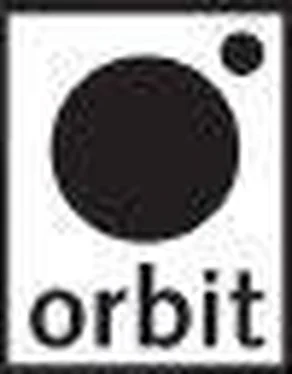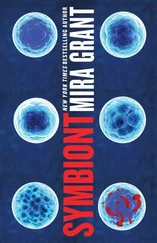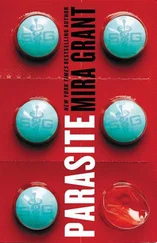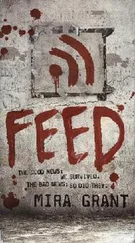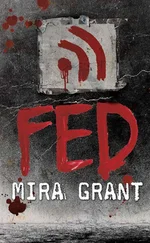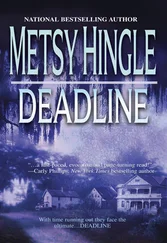“I’ll keep that in mind if I need to pee,” muttered Becks. I gave her a speculative look, which she met with a glare.
Funny, normally you’re the one pissing off the natives, said George.
I bit my lip to keep myself from answering as we followed Director Swenson through the door and into one of the long, featureless white hallways characteristic of CDC installations everywhere. It’s like they’re afraid to spend money on interior decorating when there’s such a good chance of the place needing to be hosed down with bleach at any moment. We didn’t pass any doctors, although we did walk past several large glass “windows” looking in on empty patient rooms. White walls, white beds, white floors—white everything. I woke up in one of those rooms once, after the CDC team picked us up outside of Memphis. I thought I’d died and gone to the sterilized afterlife.
Director Swenson stopped in front of a door that looked exactly like every other door in the place, except for the larger, more elaborate-looking testing unit built into the wall next to it. “The cycle takes approximately fifteen seconds,” he said, pressing his palm flat against the test pad. “Once I go through, the door will close and the unit will reset. Please don’t try to follow without a clean test. I’d really rather not send the entire facility into lockdown today.”
“It’s cool,” I said. “We know how to do our jobs.”
The light over the door turned green and the door swung open with a hydraulic hiss, saving Director Swenson the trouble of answering me. Instead, he raised an eyebrow and stepped through the doorway before the door swung closed again.
“Scale of one to ten, how stupid is this?” asked Becks, pressing her own palm against the testing panel.
Ten, said George.
“Oh, five, tops,” I said, and smiled brightly. “Don’t worry about it. We’re just here to ask the scientists some questions about science. Scientists like that sort of shit.”
“Right,” said Becks dubiously as the light turned green and the door hissed open again. She stepped through.
“Hey, George,” I muttered, flattening my hand against the testing panel. “Check this out.”
This is what I do know: A lie, however well-intended, can’t prepare you for reality or change the world. The accident victim will die whether they’re promised recovery or not, but the parent told that their child is dying may have time to prepare, and may be able to treasure those final days together even more. To tell the truth is to provide armament against a world too full of cruelties to be defeated with simple falsehoods. If these truths mean the world is less comforting than it might have been, it seems like a pretty small price to pay.
It seems to me we owe the world—more, we owe ourselves—the exchange of comfort for the chance that maybe the truth can do what people always say it can. The truth may, given the opportunity, set us free.
—From The Kwong Way of Things , the blog of Alaric Kwong, April 16, 2041

We had another meeting with the senator today. We’re about to head out, and he wants to be sure that we all understand our roles in the campaign. I don’t think he trusts us to have our heads in the game right now, and frankly, neither do I. Shaun is barely talking to anyone, including me, and Buffy simply isn’t talking. I keep running the footage of the attacks so far over and over again, looking for something that we might have missed, looking for some clue to who is responsible for all of this.
When I sent in the application for this position, I thought I was doing us a favor. I thought I was giving us the opportunity to make a name for ourselves, and that we could change the world by telling the truth. I thought I was doing the right thing. But now I watch Shaun punching the walls, and I wake up as tired as I was when I went to bed, and I just wish that I could take it back. I wish I could take it all back. I’m tired, and I want to go home.
But oh, God, I’m so afraid that we’re not all going to make it home alive.
—From Postcards from the Wall , the unpublished files of Georgia Mason, originally posted April 18, 2041
Thirteen
The CDC conference room lived up to the design aesthetic I was coming to expect from them: white on white on white. It was like they’d looked at the uniforms American nurses wore during World War II and said “Yeah, that’s what we’re talking about.” Maybe they bleached the place on such a regular basis that they didn’t want to deal with paying to have all the furnishings re-dyed. Whatever the motivation, the combination of white walls and white carpet with a glass-topped conference table and white faux-leather chairs was enough to make me feel grubby and unwashed. CDC employees probably took a lot of showers, just to keep themselves from feeling like they were too dirty to be allowed to touch the furniture.
Director Swenson walked the full length of the conference table to sit at the head. Alpha male posturing if I’d ever seen it. The gesture was designed to say “This is mine and I am in charge here”—I was sort of surprised he didn’t lift his leg and piss on something. Urine’s a natural bleaching agent, right? It would explain how they kept everything so damn white.
Becks and I trailed along behind him like good little peons, finally sitting down next to each other on the left-hand side of the table. Becks took the seat closer to the director. Sure, I was technically in charge of our little fact-finding expedition, but of the two of us, I was the one more likely to launch myself for his throat, and we wanted to avoid that if at all possible. Attacking high-ranking CDC officials isn’t really the best way to get what you want.
“Now, then,” said the director, gracing us with a fatherly smile as warm as it was artificial. “What can I do for the two of you? I’ll admit, I was a bit surprised that you didn’t phone ahead. That’s standard for most representatives of the media.”
“Yeah, we’re really sorry about that,” I said, not bothering to inject the slightest note of apology into my tone. “See, we’d usually call ahead, only I managed to leave my address book—where did I leave that again, Becks?”
“In your office,” said Becks promptly. She knows her cues. With as long as we’ve been working together, she’d better.
“Right, in my office.” I bared my teeth at Director Swenson in an approximation of his smile. The corners of his mouth twitched downward, confusion flickering in his eyes. That was good. I wanted him off balance. “That’s sort of the problem, since my office is—my office was , I guess—in Oakland, basically right at the center of the zone that got firebombed. We were out camping when the quarantine came down, but not all my people made it out.”
“I see.” Director Swenson leaned back in his chair, expression smoothing into careful neutrality. The confusion in his eyes faded, replaced by wariness. “You’re very fortunate. That outbreak was particularly bad.”
“Yeah, how did that happen as fast as it did? Isn’t the CDC supposed to prevent things like that?” asked Becks. I shot her a sharp look. She ignored me, attention focused on Director Swenson like a sniper focuses on a target.
She had friends inside the blast zone, said George. Not just Dave. Civilian friends.
It was all I could do not to wince. I’d been withdrawn since George died, which meant I never really bothered getting to know the neighbors in our bucolic little part of Oakland. Becks was a hell of a lot more gregarious. She probably knew everyone on our block, not just in our building, and could recite the names of the deceased without cross-referencing the Wall. And now we knew, beyond a shadow of a doubt, that the CDC was involv in something nasty. Put it all together, and I’d basically primed her to go off. The question was whether being stuck in the blast radius was going to be a good thing or a bad thing.
Читать дальше
